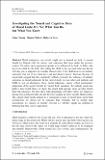| dc.contributor.author | Young, Liane | |
| dc.contributor.author | Nichols, Shaun | |
| dc.contributor.author | Saxe, Rebecca R. | |
| dc.date.accessioned | 2011-03-03T14:39:53Z | |
| dc.date.available | 2011-03-03T14:39:53Z | |
| dc.date.issued | 2010-03 | |
| dc.identifier.issn | 1878-5158 | |
| dc.identifier.issn | 1878-5166 | |
| dc.identifier.uri | http://hdl.handle.net/1721.1/61382 | |
| dc.description.abstract | Moral judgments, we expect, ought not to depend on luck. A person should be blamed only for actions and outcomes that were under the person’s control. Yet often, moral judgments appear to be influenced by luck. A father who leaves his child by the bath, after telling his child to stay put and believing that he will stay put, is judged to be morally blameworthy if the child drowns (an unlucky outcome), but not if his child stays put and doesn’t drown. Previous theories of moral luck suggest that this asymmetry reflects primarily the influence of unlucky outcomes on moral judgments. In the current study, we use behavioral methods and fMRI to test an alternative: these moral judgments largely reflect participants’ judgments of the agent’s beliefs. In “moral luck” scenarios, the unlucky agent also holds a false belief. Here, we show that moral luck depends more on false beliefs than bad outcomes. We also show that participants with false beliefs are judged as having less justified beliefs and are therefore judged as more morally blameworthy. The current study lends support to a rationalist account of moral luck: moral luck asymmetries are driven not by outcome bias primarily, but by mental state assessments we endorse as morally relevant, i.e. whether agents are justified in thinking that they won’t cause harm. | en_US |
| dc.language.iso | en_US | |
| dc.publisher | Springer | en_US |
| dc.relation.isversionof | http://dx.doi.org/10.1007/s13164-010-0027-y | en_US |
| dc.rights | Creative Commons Attribution Non-Commercial License | en_US |
| dc.rights.uri | http://creativecommons.org/licenses/by-nc/2.5 | en_US |
| dc.source | MIT web domain | en_US |
| dc.title | Investigating the neural and cognitive basis of moral luck: It's not what you do but what you know | en_US |
| dc.type | Article | en_US |
| dc.identifier.citation | Young, Liane, Shaun Nichols, and Rebecca Saxe. “Investigating the Neural and Cognitive Basis of Moral Luck: It’s Not What You Do but What You Know.” Review of Philosophy and Psychology 1.3 (2010): 333-349-349. | en_US |
| dc.contributor.department | Massachusetts Institute of Technology. Department of Brain and Cognitive Sciences | en_US |
| dc.contributor.approver | Saxe, Rebecca R. | |
| dc.contributor.mitauthor | Young, Liane | |
| dc.contributor.mitauthor | Saxe, Rebecca R. | |
| dc.relation.journal | Review of Philosophy and Psychology | en_US |
| dc.eprint.version | Final published version | en_US |
| dc.type.uri | http://purl.org/eprint/type/JournalArticle | en_US |
| eprint.status | http://purl.org/eprint/status/PeerReviewed | en_US |
| dspace.orderedauthors | Young, Liane; Nichols, Shaun; Saxe, Rebecca | en |
| dc.identifier.orcid | https://orcid.org/0000-0003-2377-1791 | |
| mit.license | PUBLISHER_CC | en_US |
| mit.metadata.status | Complete | |
